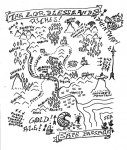(snip) For me, personally, the heart of D&D was Moldvay Basic, and not so much the death-grind reality but the heroic promise (freeing the land from the Dragon Tyrant). (snip)
That
heroic promise phrase rings true with me, and particularly because I see it as a counterpoint to
Gygaxian impotence.
Gygaxian impotence is everywhere in AD&D: one minute rounds where you basically could move, draw a weapon, or attack - but never all three according to most DMs - despite the rounds being a minute long; thieves who could nothing other climb walls with any certainty until they were level 10 or so; weapon choices that amounted to longsword, two-handed sword, bows, or irrelevance; level limits; interminable, pointless delves etc.... Yeah, give me heroic promise instead.

Some of Gygax's 8-16 page adventures are still regarded as classics - justly in my opinion - stuff like Keep on the Borderlands, Hommlet, the three Against the Giants, and the Drow-series adventures (but mostly the second - Erinhei-Cinlu). I'd put him up there with Moldvay (Lost City, Isle of Dread, Castle Amber) in terms of skilled adventure design.
BUT I realise now that Gygax's view of a megadungeon is that the GM makes it himself, gradually, in the course of play, and in response to player input (something he should have emphasised far more in his DMing advice). So a 'published Gygaxian megadungeon' is a contradiction in terms - and results in the low-value stuff you describe. I think Gygax did not have a very high opinion of people who thought they needed published material to run a campaign, and in the mid '80s he was willing to exploit them for cash when he needed it, with unfortunate results.
Frankly, I agree when it comes to those earlier adventures - especially D3 (it was the third, BTW) and Erelhei-Cinlu - but EGG was not a good designer by any objective measure as his later products even more clearly revealed. However, he clearly was a great DM. Sadly, he didn't do a good job of getting that down in writing and he never had an editor with the authority to challenge him to do a better design job.
I do, however, rate him as the entrepreneur who got D&D to market and created this hobby directly and created the computer gaming industry indirectly. That's a pretty good legacy!
As for his
low opinion of people, as you termed it, I recalled him as the author of those "one true way"
Dragon editorials of the 80s and assumed he was just an egotistical, pompous ass. I was so very pleasantly surprised when Col_Pladoh turned out to be a delight to interact with here on these boards. It really is a shame he's not still around.





